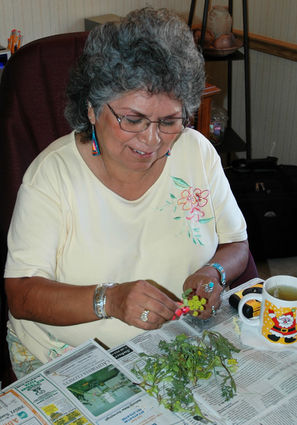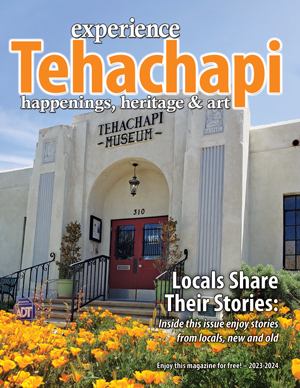How the Kawaiisu Depended on Local Plants
Teh Heritage League
On Saturday March 22, Jon Hammond will talk on "Native Plants in Native Culture: How the Kawaiisu Used the Flora of the Tehachapi Mountains for Food, Fiber and Medicine" at the Tehachapi Depot at 6 p.m.
The presentation will include demonstrations of some traditional uses of native plants, with plant samples and handmade items available for examination, with some traditional foods prepared for tasting.
According to Jon Hammond, "The Kawaiisu Indian people depended on the plants around them to supply most of their food, fiber and medicine. They made their homes, their baskets, and the nearly all of their possessions from the plants found growing in the Tehachapi Mountains and surrounding areas. We'll be examining plant samples and seeing how local plants have been used for centuries in a variety of creative ways."
"At the talk, we're going to be providing samples of some different Kawaiisu foods, and as a bonus, we'll also be serving traditional dandelion green salad with hard-boiled egg, bacon and hot dressing, using a heirloom German country recipe that was handed down to Del Troy's Pennsylvania ancestors."
Ethno botanist Dr. Maurice Zigmond studied the Nuwa or Kawaiisu people in the 1930s and again in the 1970s. He documented the traditional use of about 250 different plant species and subspecies, with 120 species furnishing food and beverage, more than 100 for medicine and 90 for miscellaneous purposes and services.

Lucille Girado Hicks cleaning koovoos. Koovoos is a type of wild green that grows in profusion in Tehachapi in the Spring. It was cooked and used as a foodstuff by the Kawaiisu.
Dr. Zigmond had this to say: "The botanical traditions of the Kawaiisu permeated every facet of their culture. Plants played a role not only in diet, medicine and the manufacture of diverse items, but also in ritual, mythology and the realm of the supernatural." Thanks to the Kawaiisu informants who supplied Dr. Zigmond with their knowledge, as well as the continued traditions of the Kawaiisu people, we know quite a lot about the plants they used and the different ways in which they have used them.
Reservations are suggested. Tickets are $15 each and can be purchased at the Tehachapi Museum during regular hours (Fridays, Saturdays and Sundays from
Noon to 4 p.m.) or by calling the Museum at
661-822-8152 and leaving a message.
The Museum is located at 310 S. Green St. Tehachapi, CA.





